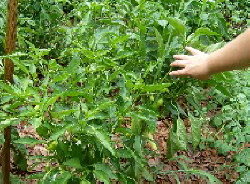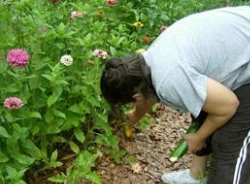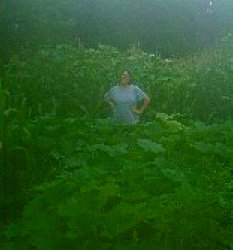





I recently found myself thinking about a grand-fatherly gentleman I knew many years ago. He was a gentle, soft-spoken man that spent most of his time in the vegetable garden. He knew everything there was to know about growing any kind of vegetable. This kindly gentleman has long sense gone to his reward in heaven. I imagine him there, still telling stories about the year he grew enough potatoes to feed the entire town or how many of those ‘bad beetles' he had to pick off his green beans for two weeks straight.
It made me think of my first attempt at vegetable gardening. To say the least, it was laughable. I did reap a few good fruits from my labor, even though most of my attempts were a dismal failure. My own earlier gardening experiences in mind, I decided to speak to a new gardener, Jessica Hagans, who has enjoyed much success in her gardens. I wanted to find out just how she went about it and what lessons she has learned so far. Now, I'd like to share what I found out with you.
Here is what she had to say.
Q: What made you decide to start a vegetable garden?
A: "I grew up on homegrown veggies both from our family and extended family's gardens. There is such a difference in flavor. I was also increasingly concerned about pesticides trapped in the paraffin wax on so much of the produce that is commercially available."
Q: What sort of research did you do before beginning your garden?
A: "I researched many, many different books and approaches but my two favorite books are, The Country Person's Encyclopedia by Carla Emery and How to Grow More Vegetables on the Bio-Intensive Method by John Jeavons."
Q: How did the research contribute or hinder your first garden?
A: "It was a huge encouragement to me! I love to read about others experiences. I really love to succeed but failure is great too, because that is when we learn the most. What I really got from the research I did is that everyone can do anything but maybe not the first time and some crops will just be easier if you choose ones that like your climate."
Q: What year was your first garden?
A: "Winter 2006-07. I tried the winter sowing method for my seeds in the house. It was productive but I had a mess in my den for weeks. I had egg cartons, trays, cups, bowls and anything else that would hold soil spread across every surface in my den. I even had newspapers and tarps spread all over the floor. There were literally hundreds of seedlings in my house waiting for spring."
Q: What was the cost to start your first garden and how does it compare to what you will spend next year?
A: "Approximately $500.00"
Below is the breakdown of costs that she gave me:
$300.00 for mushroom compost
$100.00 for seeds, bone meal mix and other nutrients to make fertilizer
$100.00 for chickens (She added, "My own nitrogen factory and garden produce recycler")
A: "Next year it will be a bit more. Approximately $1000.00-$1500.00"
Following is the breakdown for next year that she shared with me:
$100.00 for a seed planter
$300.00 for another dump truck load of compost
$500.00 for green house area/ seed starting supplies
$300.00 for more irrigation supplies
$200.00 for seeds, specialty organic pest control measures and soil amendments.
A: "These amounts will be adjusted as I determine my actual needs."
Q: What supplies did you purchase in the beginning?
A: "A dump truck load of compost! It was a tad fresh and it sure did smell! Boy howdy did it help grow some wonderful tomatoes, corn, spaghetti squash, lettuce, onions, potatoes and on and on!"
Q: How large is your garden?
A: "The front garden is 40 by 60 feet and the field is about two acres."
Q: What have you done differently with your second vegetable garden?
A: "We installed irrigation over the front garden and field so, I no longer have to water by hand. Yay!"
Q: What will you do differently next year?
A: "We are moving into market gardening next year. So we are working on organizing and building market connections."
Q: What supplies have you learned are necessary/unnecessary?
A: "If your soil is not 'rich', you must amend it. You need only minimal supplies, really. A shovel, a hand spade, a pitchfork, a hoe, a wheelbarrow and lots of hard work. The rest, you can pretty much make do with. (My husband did use his uncle's tractor to disc up the back field and that saved me a huge lot of work)"
Q: What are your favorite tools/supplies/materials?
A: "My most favorite supply is the Burpee seed starter tray. I started out using egg cartons and every other small object I could find to put dirt in. The seed tray comes with these great little cubes and the seedlings love them, they are so easy and productive. I also love the stretchy garden gloves that have the polypropylene coating on the palms and fingers. I can even feel carrot seeds in those things!"
Q: What did you find the least & most difficult to grow?
A: "The easiest to grow, for volume produced, were potatoes. Full bellies for little work when planted the bio-intensive way. The hardest was celery. I simply could not make it grow!"
Q: How has gardening affected your life overall?
A: "It has enabled me to teach my children where their food comes from and allowed me to have a greater variety of vegetables for the family dinner table. I've also been pleased to witness my children's eyes light up when they learn all this wonderful food comes from a tiny seed that they helped to plant. Finally, I have lost 80 pounds. Need I say more?"
Q: What has most surprised you about growing a vegetable garden?
A: "My husband and I are spending a lot more time together. This has become a joint project. It really has become recreation for us. Life is so crazy. The hard work in the garden is actually a respite."

Photo by Jeannette Adams
used with permission
Left, pulling back plant to locate peppers
Right, zuccini under zinnias

Photo by Jeannette Adams
used with permission
Jessica Hagans spent time in and around gardens while growing up, but never really got serious about it until recently. She lives in north Florida and is married with two children. I know this new gardener very well. She is my eldest daughter.
I have seen the hard work she puts into her gardens. It pays off in more ways than she can count. I, for one, am very proud to see what she has accomplished in under two years. In her eagerness to learn a better way to feed her family's bodies, Mrs. Hagans is teaching her children valuable lessons on her mini farm that also feeds them emotionally and spiritually. These lessons will last throughout their lives and hopefully be passed down to their own children.

Mrs. Hagans standing between
her squash and corn plants. It
was misting rain the day these
photos were taken. A relief from
the extreme heat.
To buy a copy of Mrs. Hagans' two favorite gardening books, Carla Emery's book: The Country Persons Encyclopedia and John Jeavons' book: How to Grow More Vegetables on the Bio- Intensive Method, you might like to try these sources. Amazon.com, Barnes and Noble.com, BAMM.com, Booksense.com You may also want to check at your local bookstore. You will also find copies at your local library.
A good source for learning about organic gardening is right here at Dave's Garden on the Organic Gardening Forum.
By visiting the Vegetable Gardening Forum here at Dave's Garden, you will find many great gardeners willing to help you with all your garden questions.
All photographs in this article were taken by Jeannette Adams on a misty day in Jessica Hagans gardens.
Copyright © www.100flowers.win Botanic Garden All Rights Reserved